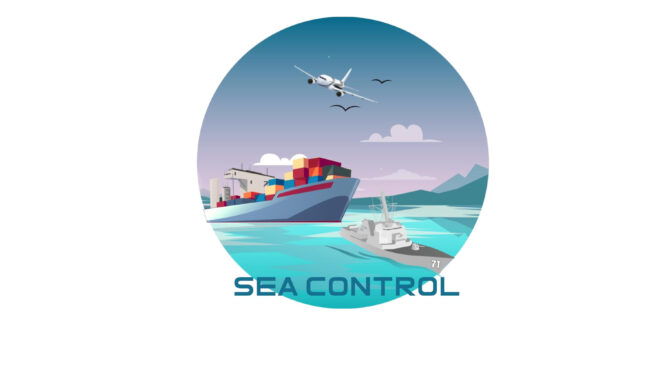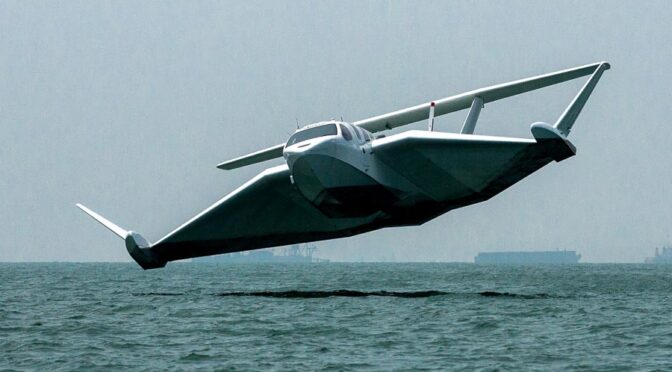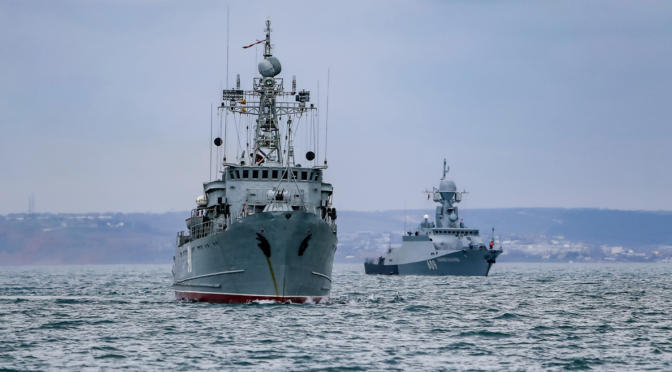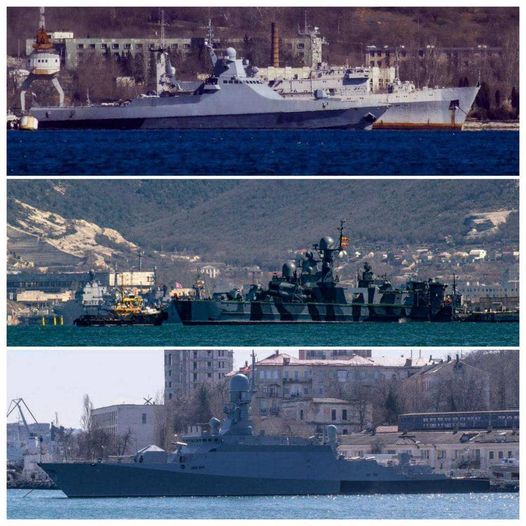By Michael Knickerbocker
The People’s Liberation Army – Navy, PLA(N), has rapidly modernized and grown their fleet with advanced warships and weapons. China’s fleet expansion and widening air defense system reach threaten the United States’ power projection capability in the Indo-Pacific.1 At the same time, Russian expansion in the Black Sea region has further expanded and entrenched area denial and forward basing capabilities.2 With the reality of flattening, or shrinking budgets, it is imperative that the United States Navy leave no stone unturned in looking for disruptive technologies that continue to tilt the balance of power in their favor.
Modern warships can bring considerable firepower for a mobile platform, but, along with advanced air defense radars, also possess system limitations and watchstander challenges when targeting smaller, more agile, and low to the surface targets.3 A sea-skimming platform in the role of a maritime attack craft could exploit vulnerabilities in system automation, low elevation detection capability, watchstander training, and radar system set-up.4 A wing-in-ground maritime attack craft (WMAC) would present an opportunity to field a cost-effective, survivable asset that can punch above its weight and cost. Such a platform would assist the United States naval battlegroups in attriting adversarial surface platforms and shore-based area denial systems to pursue maritime superiority in a contested environment. The United States Navy should pursue the acquisition, experimenting with, and eventual conversion of commercially produced wing-in-ground craft to fill an anti-surface warfare role until purpose-built designs can be developed, tested, and fielded.
Potential Mission Roles and Tactics
Wing-in-ground effect craft (WIG) rely on the interaction of physical forces with the water’s surface to allow them to operate only a few meters above the water’s surface, or within one wing’s distance although some WIG craft can operate inside and outside of ground effect.5 They are wind and sea state limited for take-off and landing, but sea state is not as much of a factor once operating in ground-effect.6 WIGs offer a platform that can maneuver close to the surface of the water, exploiting limitations in modern radar systems at speeds over 250 knots and with ranges up to 1000 nautical miles.7 8 They are fast, maneuverable, and could be up to five times as fuel-efficient as aircraft that do not operate in ground effect.9 These characteristics have already sparked the United States Department of Defense’s interest in applying the technology.
The Defense Advanced Research Projects Agency (DARPA) has already called for potential designs to explore WIG feasibility and application for the role of strategic sealift.10 There is extreme value in such platforms in a significant conflict in the Indo-Pacific from the aspect of heavy lift and logistical support in a contested environment. But, the Department of the Defense, specifically the Department of the Navy, need not limit the application of WIG platforms to only one role. WIG design potential as a low-cost, shorter production timeline, anti-surface warfare platform should not be ignored. The application of WIG designs should not be about choosing one platform to fill a distinct role. It should be about adopting and applying a disruptive technology that can benefit multiple mission areas. A WMAC would provide a battle group with the ability to mitigate the threat of forward-deployed adversarial surface combatants that are currently able to outrange the United States Navy’s offensive weapon systems. This is a role like previous iterations of missile patrol boats that were removed from inventory in the 1990s. These smaller missile patrol boats had limited sea denial ability due to their smaller size limiting them to calmer seas and closer to shore. Modern systems and the location of the potential fight require a platform that can be taken into contested areas to take the fight to the adversary.
Sea-skimming missiles have long exploited the limited radar horizon of surface ships. Although the open ocean lacks micro-terrain and other means to block line of sight that exist overland for a drone to exploit, the phenomenon of surface scatter coupled with pre-set radar track filters to disregard presumed ‘false tracks’ create an exploitable opportunity. A wing-in-ground craft can take advantage of this sensing gap. By creating unusual track behavior patterns by utilizing combinations of indirect approaches, speed, and altitude outside the normal parameters of current known surface, air (rotary or fixed wing), or missile platforms, stressing radar operators’ proficiency and system track logics. Although systems and trainings will adapt, the initial introduction and novel nature of track behavior control will initially exploit existing detection gaps and stress the capabilities of systems and their operators. With the ability to take off and land within roughly 500 meters, a WMAC could combine its unique track characteristics with indirect, sprint and drift approaches to a target or waypoint.11 This approach would present unique challenges to radar system design, operational set-up, and watchstander training while mitigating the risk of operating within probable surface ducting effects of the adversary’s radar. By starting and stopping ground-effect legs of travel at speeds near predicted system track-filter speed settings, and then altering course while in the water, a WMAC could appear to be a series of false tracks, ostensibly referred to as ‘zoomers’ by watchstanders, while conducting a recon patrol or a maritime strike mission against an identified target. The ability to take off and land within short distances would also increase the survivability of a WMAC when engaged by adversarial missile systems or aircraft when coupled with electronic or physical countermeasures. These countermeasures could include a combination of towed or rocket-launched decoys, camouflage paint schemes, radar absorbent materials, electronic signal repeaters, and avoidance maneuvers. WIG craft would also only need to close targets as much to be within maximum range of their weapons, often on the outer limits of the adversary’s own weapons range increasing their survivability and need to avoid detection.
A WMAC could scout ahead of a battle group to loiter until it detects a signal correlating to a specified target, relay targeting data, engage the target with a combination of anti-ship cruise missiles (ASCM) or high-speed anti-radiation missiles (HARM), and then evade by maneuvering or attempting to blend in with the ocean surface until it can return to the battlegroup to refuel and re-arm. This application is like that of diesel-electric submarines that use their ability to bottom to position themselves to attack a transiting force or to evade counter-detection and engagement after firing at their target. Include. The ability to launch munitions in support of a battle group and a landing force from off-axis, or forward deployed, adds another dimension to exploit by operational planners. The outfitting of a WMAC should be to degrade or destroy radar equipment on surface combatants. Degrading or destroying combatants is known as “mission kill” which is more than sufficient to meet many potential tactical objectives, especially in a battle waged on the sea in the Indo-Pacific or Black Sea regions. Such objectives, when met, can provide the conditions necessary to flow in larger capital ships to close the enemy force and bring their full combat power to bear in a more permissive environment by attriting adversarial surface combatants in their ability to detect, track, and engage United States naval forces.
Initial WMACs would likely need to embark on amphibious ships to launch utilizing well-decks or crane systems. A potential commercial design for WMAC conversion would be the Wigetworks Airfish-8, roughly 50 feet wide and 60 feet long without modifications to fold-and-stow the wings or tail section. As a frame of reference, a Landing Craft Air Cushioned (LCAC) is 48 feet wide and 91 feet long.12 Three WMACs to be loaded in place of two LCACs into a compatible well-deck as found on the San Antonio Class (LPD-17), Harpers Ferry Class (LSD-49), and America Class Flight IIs (LHA-6).13 14 15 A Wasp Class (LHD-1) would be able to embark four WMACs.16 While still utilizing current USS ships, a crane-based option would be the Lewis B Puller Class Expeditionary Sea Bases (ESB).17 ESBs are designed for moving cargo to forward operating areas with a configurable main-loading deck. These ships could potentially embark and deploy between four to six WMACs. Initial designs would implicitly guide tactical employment and embarkation limitations.
Design Considerations for Initial WMAC Conversions
The threat in the Indo-Pacific could require action within the next three years.18 Contractor bids to design, build, and test new platforms typically take much longer than that possible timeframe – not to include placing the design into production, training personnel. To accelerate the acquisition timeline, the Navy should expeditiously acquire existing commercially produced craft. For this theoretical exercise, we will build out a modified Wigetworks Airfish-8.
Singapore-based Wigetworks, produces the Airfish-8, a WIG that can support a two-person crew with six to eight passengers and a total cargo of 1.1 tons. The craft is 56 feet (17.2 meters) long and has a wingspan of just over 49 feet (15 meters), just slightly smaller than an F/A-18 E/F Super Hornet.19 20 The Airfish-8 is limited in speed and range with maximum speed of 106 knots and only 300 nautical mile range while operating at a max above-surface height of just under 23 feet (7 meters) making it suitable for fleet experimentation but not combat operations. Although not in full-scale production yet, Wigetworks indicated that each unit will likely cost around $500,000. Even if this price point is doubled to $1 million, it still provides a low-cost experimental platform.
Operating a WMAC based on the Airfish-8 could be limited to only a pilot and a weapon systems operator. The pilot and weapon systems operator, however, would not require traditional naval flight school since the classification of WIGs as boats. This would allow for these billets to be opened to Chief Warrant Officers or even enlisted ranks like how the Navy currently crews LCACs. This would allow for potential options to include additional fuel, bunks, or equipment racks in the cabin in lieu of passenger seating installed on the commercial use variant. Crew space and bunks would depend upon the decision for operational employment and whether a WMAC would pre-position and drift for extended periods. The current engine design of a gasoline-powered V-8 would likely need to be swapped out with a JP-5 fueled turboprop, which is more powerful and fuel-efficient.
A converted Airfish-8 would likely have one weapon hardpoint per wing considering wing space, weight limitations, and drag calculations for impact to speed and range. The load out would consist of ASCM or HARM. Engineering considerations would have to be considered for potential issues to include weapon weight and minimum launch airspeed requirements to include potential booster modifications depending on the weapons selected for use by a WMAC. Missile options should also not be limited to weapons currently in the United States’ inventory. Partner and allied nations such as France and Norway, among other Western countries, produce ASCMs that are in many ways superior to the limited United States Navy offerings.
A first-generation Airfish-8 WMAC test platform, as described, might cost roughly $5 to $15 million per unit, although cost estimation for prototypes is notoriously difficult. This price-point pales compared to the estimated $81 million per aircraft of the F-35 program.21 Aside from cost, is the reality that more expensive, and thus more complex, platforms usually come with significant lead times for production. Less complex and less expensive platforms would likely come with the advantage of being able to produce at a higher rate which would help with initial fleet inventory numbers as well as replacements for units lost due to accidents or combat.
Conclusion
In obtaining and fielding maritime platforms for use in a potential conflict with China or Russia, cost-effectiveness and speed to fleet are vital to the United States’ security concerns and strategy. The Indo-Pacific theater is a predominantly maritime theater governed by the tyranny of distance and the threat of a rapidly growing, modern Chinese Navy. The Black Sea region saw Russia annex the Crimean Peninsula and built up standing naval forces in the area following by the widely publicized and condemned Russian invasion of Ukraine. If conflict with these peer adversaries come to fruition, we must account for the grim reality of modern combat with equally advanced opposition – the United States will suffer losses. As modern weapons get faster and more lethal, the old belief of United States’ fast and advanced platforms being superior to the opponent will no longer hold true. While WMACs possesses inherent weaknesses when faced with SAM or fighter threats, their ability to scout ahead of a battle group and degrade or destroy the systems on adversarial surface platforms needed to target the battlegroup will justify the risk. A small crew, small price tag, and shorter production timeline for a replacement represent a significantly lower risk than losing a major surface combatant such as a destroyer, cruiser, or even worse, an aircraft carrier.
The reality of the theater and threat has stoked discussions surrounding the applications of wing-in-ground-effect platforms and seaplanes in recent years. But discussion is not enough. The United States Departments of Defense and the Navy need to pursue and field platforms before they are required. Near-term acquisition and modification of commercially produced, proven WIG designs provide a stop-gap measure to field capability to these, and potentially other, key regions until purpose-built military platforms can be designed and tested. This second generation of WMACs should explore hull-form shapes to reduce radar-cross-section, a vertical or catapult launch capability to expand the number of platforms they can embark on, and power plant options to increase range and speed for evasion.
The plausibility and timelines of potential conflict in the Pacific and Eastern Europe involving the United States are tenuous and fluid. The rapid development and deployment of a WMAC would allow the United States Navy to directly counter the growing size and capability of Chinese and Russian forces by exploiting the inherent weaknesses of modern systems. This capability provides additional conventional deterrence to Chinese military aggression vis-à-vis Taiwan and the South China Sea and towards Russian aggression in the Black Sea and Baltic regions.
Wing-in-ground-effect craft provide tremendous potential for strategic lift and other vital mission sets. However, in examining the applicability and effectiveness of the technology, the United States Departments of Defense and the Navy must not overlook the viability and role of smaller, shorter-range platforms. Now is the time to take decisive action that can potentially turn the tide of a future conflict in the Indo-Pacific or the Black Sea regions. To neutralize or deter rising adversaries, the United States Navy must send skimmers to the skirmish.
Commander Michael Knickerbocker is a United States Navy Surface Warfare Officer with previous experience as an AEGIS Combat Systems Officer and Integrated Air Missile Defense Planner. He is currently a Federal Executive Fellow at the Clements Center for National Security at the University of Texas at Austin conducting independent research into naval equities impacting current national security situations. His research focuses on technology adaptation into maritime strategy as well as maritime trade security assessments and risk identification. The views expressed are those of the individual writing them and do not reflect the official positions of the U.S. Department of Defense, Department of the Navy, or the University of Texas at Austin.
Endnotes
[1] O’Rourke, Ronald. 2022. China Naval Modernization: Implications for U.S. Navy Capabilities- Background and Issues for Congress. Washington DC: Congressional Research Service.
[2] Gressel, Gustav. 2021. “Waves of Ambition: Russia’s Military Build-up in Crimea and the Black Sea.” European Council for Foreign Relations. September 21. Accessed January 24, 2022. https://ecfr.eu/publication/waves-of-ambition-russias-military-build-up-in-crimea-and-the-black-sea/.
[3]Oyvind Overrein, Andreas Birkeli. 2021. Radar Detection Evaluation Method for Sea Skimming Targets Including Effective Flight Altitude Simulations as Seen by Radar. NATO paper, Brussels: NATO.
[4] White, Ryan. 2021. “What is Sea Skimming? How Effective Sea-Skimmer Missiles?” Naval Post. April 3. Accessed January 24, 2022. https://navalpost.com/anti-ship-missiles-what-is-sea-skimming/.
[5] International Maritime Organization. 2022. “Wing-in-Ground (WIG) Craft.” International Maritime Organization. Accessed January 24, 2022. https://www.imo.org/en/OurWork/Safety/Pages/WIG.aspx.
[6] WigetWorks. 2020. Airfish-8 FAQ. Accessed January 24, 2022. https://www.wigetworks.com/faq#:~:text=It%20has%20a%20higher%20operational,15%20knots%20of%20cross%20wind.
[7] Michael Halloran, Sean O’Meara. 1999. Wing-in-Ground Effect Craft Review. Melbourne: Australia Department of Defence. https://apps.dtic.mil/sti/pdfs/ADA361836.pdf.
[8] Walker Mills, Dylan Phillips-Levine, Joshua Taylor. 2020. “Modern Sea Monsters: Revisiting Wing-in-Ground Effect Craft for the Next Fight.” Proceedings. https://www.usni.org/magazines/proceedings/2020/september/modern-sea-monsters.
[9] Ingels-Thompson, David. 2021. “Rethinking SEAD for A2/AD.” Proceedings. https://www.usni.org/magazines/proceedings/2021/april/rethinking-sead-a2ad
[10] Katz, Justin. 2021. “DARPA Hopes A Plane Boat Hybrid Can Solve the Pentagon’s Sealift Challenge.” Breaking Defense. August 30. Accessed January 24, 2022.
https://breakingdefense.com/2021/08/darpa-hopes-a-plane-boat-hybrid-can-the-pentagons-sealift-challenge/.
[11] Department of the Navy. 2020. Airfish-8. Accessed January 24, 2022. https://www.wigetworks.com/airfish-8.
[12] Department of the Navy. 2021. “Landing Craft, Air Cushioned Fact File.” Navy.com. October 14. Accessed January 24, 2022. https://www.navy.mil/Resources/Fact-Files/Display-FactFiles/Article/2170004/landing-craft-air-cushion-lcac/
[13] Department of the Navy. 2021. “Amphibious Transport Dock – LPD.” Navy.com. January 21. Accessed January 24, 2022. https://www.navy.mil/DesktopModules/ArticleCS/Print.aspx?PortalId=1&ModuleId=724&Article=2222713.
[14] Department of the Navy. 2019. “Dock Landing Ship – LSD.” Navy.com. July 19. Accessed January 24, 2022. https://www.navy.mil/DesktopModules/ArticleCS/Print.aspx?PortalId=1&ModuleId=724&Article=2222713.
[15] Department of the Navy. 2021. “Amphibious Assault Ships – LHA(R).” Navy.com. April 15. Accessed January 24, 2022. https://www.navy.mil/DesktopModules/ArticleCS/Print.aspx?PortalId=1&ModuleId=724&Article=2169814.
[16] Department of the Navy. 2021. “Amphibious Assault Ships – LHD.” Navy.com. April 15. Accessed January 24, 2022. https://www.navy.mil/DesktopModules/ArticleCS/Print.aspx?PortalId=1&ModuleId=724&Article=2169814
[17] Department of the Navy. 2021. “Expeditionary Sea Base – ESB.” Navy.com. January 21. Accessed January 24, 2022. https://www.navy.mil/Resources/Fact-Files/Display-FactFiles/Article/2169994/expeditionary-sea-base-esb
[18] Quinn, Jimmy. 2021. “Beijing’s Taiwan Invasion Timeline: Two Predictions.” National Review. November 8. Accessed January 24, 2022. https://www.nationalreview.com/corner/beijings-taiwan-invasion-timeline-two-predictions/.
[19] WigetWorks. 2020. Airfish-8. Accessed January 24, 2022. https://www.wigetworks.com/airfish-8.
[20] Department of the Navy. 2021. “F/A-18 A-D Hornet and F/A-18 E/F Super Hornet Strike Fighter.” Navy.com. February 4. Accessed January 24, 2022. https://www.navy.mil/Resources/Fact-Files/Display-FactFiles/Article/2383479/fa-18a-d-hornet-and-fa-18ef-super-hornet-strike-fighter/.
[21] Grazier, Dan. 2020. “Selective Arithmetic to Hide the F-35s True Costs.” Project on Government Oversight. October 21. Accessed January 24, 2022. https://www.pogo.org/analysis/2020/10/selective-arithmetic-to-hide-the-f-35s-true-costs/.
Featured Image: The Wigetworks Airfish 8 aircraft, (Photo via Wigetworks PTE LTD.)






